Setting the tone: A dramaturg’s process
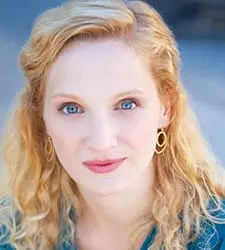
Jessica Bedford
TouchTones dramaturg, Jessica Bedford, illuminates the process of dramaturgy and the role of the dramaturg in new play/musical development.
For those who don’t know, what is a dramaturg?
One of my favorite grad school professors said that, “Dramaturgy is the historical and critical conscience of a play.” It approaches a piece of theatre like an anthropological study: What was going on historically and socially when the play was written? How did that history affect the writing of the play and shape the themes and thoughts within it? And how/why are those themes and thoughts still relevant for an audience today? The answers to these questions effect how a play is designed, staged, and produced so it’s my job, as dramaturg, to provide that context and that research for the writers, actors, designers, and director.
On a new play like TouchTones a dramaturg also keeps an eye on the developing structure of the piece. It can be hard for the writers to be both creators and editors at the same time. Too much of the latter can really stunt the former and we want our writers feeling as creative as possible. So I take some of the editorial burdens off their plate and pay attention to structure. For example, if a new scene introduces a new theme or storyline or conflict, I keep an eye out for where it’s resolved and make sure the play isn’t left with loose threads.
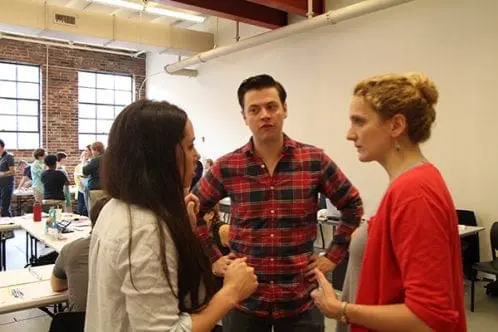
Alex Keiper, Michael Doherty, and Jessica Bedford chat before rehearsal.
How does the dramaturgical work for a musical differ from work needed on a play?
Honestly, not very much at all. Music can change tone so I do help the writers keep an eye on whether or not a song hits the right note in a scene (pun absolutely intended). One also has to ensure that the plot moves forward on the songs instead of in the scenes. The terrible musicals I’ve seen almost always make the mistake of putting the big action or event in dialogue and sing songs with more expositional or commentary moments.
Where do you let your process begin?
Always with a good long date with the script. If it’s a new play, I then chat with the writer(s). If it’s an established play, I then chat with the director. The first question, though, is always the same: What do you want your audience to walk away thinking or feeling?
Dramaturgs ask the playwright a lot of questions about the play. What are some questions you like to ask?
Well, hey, see above.
When it comes to editing and a writer is hesitating over cutting or keeping a moment, I like to ask, “What does this buy us?” or “How does this move the story forward?” When they can’t answer that, it usually becomes clear that the moment or line has to go. Having an objective viewer can really help a writer detach.
When it comes to things that feel dropped or anemic, I like to ask, “Where does [xxx] live in the play?” You have to remember that when dissecting a play, you’re talking about someone’s creative work that they’ve poured years into. A good dramaturg’s questions should feel like invitations more than criticisms (even when their intent is critical).
Describe the “world” of TouchTones for us.
It’s a warm, open place, actually. All walks of life are embraced with humor and care.
How do you know when you’ve researched a topic enough?
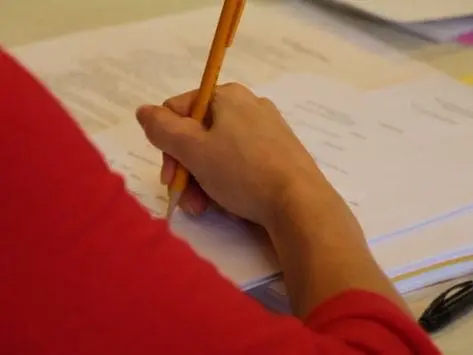
Jessica makes notes in her script.
Ah! The answer is “just enough.” You have to remember that you’re collaborating with people who have A LOT on their plates. Actors have lines, songs, and choreography to learn. The writers are generating new pages and slashing others. The director has the entire production in her head. When someone asks for some research, give them just enough to answer their question but not so much that it overwhelms them. When passing along requested research, I try to keep it down to what a person can reasonably digest in one evening, after a long day of rehearsal. I leave it to them to ask for more if they want it.
Is there anything you’ve discovered in your research that you found surprising?
I can’t answer that question and keep this PG.
Have you considered not knowing the answer to a question? How do you leave it unanswered?
Absolutely! In fact, it’s critical to say “I don’t know” when you don’t know. If it’s a question that can be researched, I get to it until I find an answer (i.e. what did the cover of The Joy of Sex look like in 1999?). If it’s the writer or director asking me something that I don’t know the answer to, it’s even more critical to be honest. Lots of times they’re turning to me to be that objective observer so if they’re hoping I’ve picked up on a detail and I haven’t, they really need to know that because chances are the audience won’t pick up on it either. Also, theatre is a collaborative art. There can’t be trusting collaboration where there’s no honesty.
What is the relationship between dramaturg and playwright? Composer? Cast?
Dramaturg and Playwright
This relationship has got to be close. After all, if the writer can’t be in the room, I’m something of his representative. If the playwright is the parent and the play is the child, the dramaturg is that best friend that can be counted on to babysit twice a week and has all the kid’s allergies memorized.
Dramaturg and Composer
A more watered-down version of the above.
Dramaturg and Cast
Do you remember that librarian in undergrad who would point you in the right direction when you were researching a paper and was always really happy to see you and even remembered what your last paper was about and would ask after your grade? That’s me. I’m here to give them what they need and root them on.
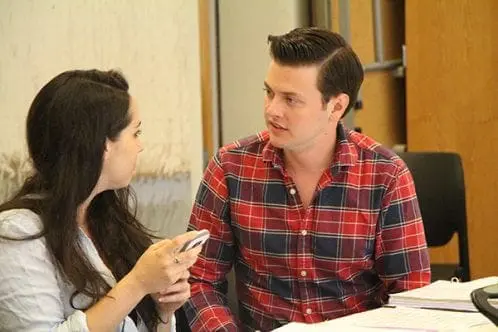
Alex Keiper and Michael Dopherty read through a scene.
How does your role change once rehearsals begin? In tech? Before opening?
Once a play or musical goes into the rehearsal hall, the dramaturg shifts into “hurry up and wait” mode, in terms of her research responsibilities. But the “objective observer” duty kicks into high gear. To that end, I’m only in the rehearsal hall three days a week so that I can see things anew and so that I’m not biased from, say, overhearing a conversation about how so-and-so really wants this prop to work or this song to be cut, etc. As it gets closer to tech and opening, I also have to edit my notes/thoughts. At that point in the process, there’s only so much the director and actors are going to be able to fully incorporate so I only speak up about the big things.
What do you most want audiences to take away from this story?
Whatever Michael and Manu want them to take away. That’s not me being cute, that’s my role in this process.
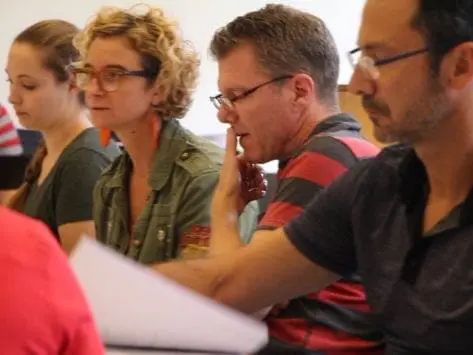
Director, playwright, and composer listen to the a reading of TouchTones.
Who is your favorite character in TouchTones and why? And/or favorite song?
The best friend who babysits twice a week isn’t allowed to have favorite characters. I adore all of these actors and their portrayals equally.
As for a favorite song, Delilah makes me stomp my feet, forget just tapping them. And I find myself humming Ready all week long. The melody is so lovely.
What are you working on next!?
Well, I’m playing Mrs. Cratchit in A Christmas Carol at the McCarter Theatre. How’s that for a change of pace?
About the Dramaturg
JESSICA BEDFORD is a Philadelphia based theatre artist. Previously, at the Arden, she served as production Dramaturg on Equivocation and served as assistant to playwright Michael Hollinger on Under the Skin. She was formerly the Associate Artistic Director at Montgomery Theater where she oversaw the Education and Dramaturgy programs for five years. Jessica teaches at DeSales University, Temple University, Villanova University and the Walnut Street Theatre School. She is a member of the Dramatists’ Guild and Actors’ Equity Association.
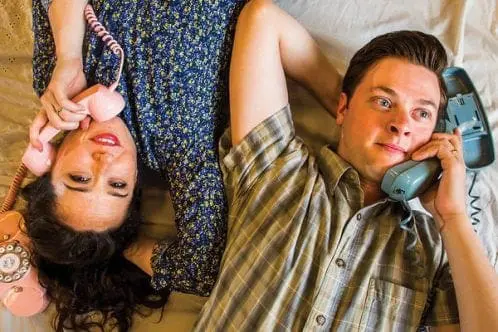
Photo: Wide Eyed Studios
TouchTones
Story by Michael Hollinger & Robert Maggio
Book & lyrics by Michael Hollinger
Music by Robert Maggio
Directed by Emmanuelle Delpech
On the Arcadia Stage
OCTOBER 19 – DECEMBER 3, 2017
A new musical comedy about love, sex, and the fantasy at the other end of the line…
It’s 1999, the cusp of a new millennium, and technology promises intimacy as well as anonymity. Christine and her fiancé Justin wander into this titillating world of role-play, secret delights, and shifting identities; but who will they be when they come out again? (And will they recognize themselves?)
Contains adult language and themes, including sexual situations.
Production Sponsor:
Fox Chase Bank Charitable Fund
Honorary Producers:
FRED AND EMILY ANTON
